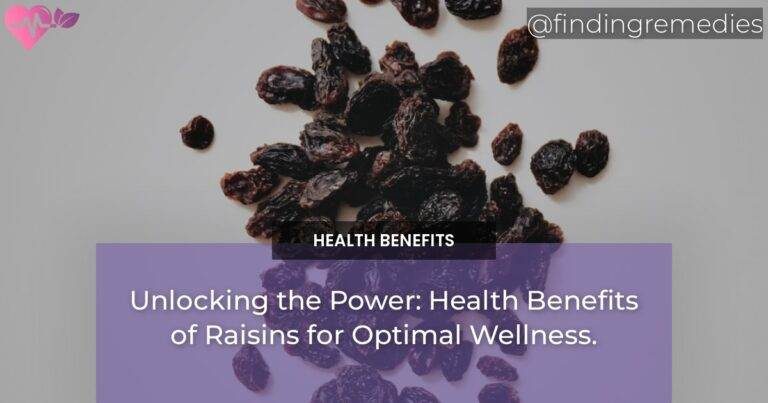Health Benefits of Raisins: Foods as Medicine
Raisins Nutrition Profile and Natural Compounds
Raisins, also known as dried grapes, are packed with essential nutrients, including fiber, polyphenols, flavonoids, vitamins, and minerals. A half-cup serving of raisins contains:
- 217 calories
- 1 gram of protein
- 2.3 grams of fiber
- 31 grams of sugar
- 0.5 grams of fat
- 6% of the daily value (DV) for potassium
- 3% of the DV for iron
- 1% of the DV for calcium
- 1% of the DV for vitamin C
Raisins also contain natural compounds such as antioxidants, phytonutrients, and flavonoids that offer numerous health benefits.
Health Benefits of Raisins
Raisins’ Role in Improving Digestive Health
Raisins are high in fiber, which makes them an excellent dietary addition for promoting healthy digestion. The fiber in raisins work as a natural laxative, which helps to relieve constipation and regulate bowel movement.
Raisins and its Potential Benefits in Improving Cardiovascular Health
Raisins contain polyphenols and antioxidants that help to reduce inflammation in the body, which is essential for heart health. The high fiber content in raisins also helps to lower cholesterol levels and reduce the risk of cardiovascular disease.
ALSO READ
Raisins’ Effect on Glycemic Control and Pre-Diabetes Risk Reduction
Raisins have a low glycemic index and can help to stabilize blood sugar levels, making them a great snack option for people with diabetes. The natural compounds present in raisins also offer potential benefits in reducing the risk of developing type 2 diabetes.
Raisins’ Positive Impact on Bone Health and Anemia
Raisins contain a variety of essential minerals, including calcium, iron, and potassium, that are crucial for bone health and preventing anemia. The high content of iron in raisins also makes them an excellent dietary addition for people who suffer from iron-deficiency anemia.
Effects of Cooking and Proper Storage on Raisins
ALSO READ
The Effect of Cooking on Raisins’ Nutritional Profile and Natural Compounds
Cooking can cause some loss of nutrients in raisins, but they still retain most of their nutritional benefits. Cooking also enhances the flavor of raisins and makes them a great addition to a variety of dishes, including salads, soups, and stews.
Proper Storage Practices to Preserve Raisins’ Nutritional Value and Natural Compounds
Proper storage is essential to maintain the nutritional value and natural compounds of raisins. Raisins should be stored in an airtight container in a cool, dark place to prevent them from drying out and losing their flavor and nutritional value.
Raisins Varieties, Types, and Disadvantages
Overview of Different Raisin Varieties and Types
Raisins come in various types, including golden raisins, black raisins, and currants. Each type has a unique flavor and nutritional profile, making them a versatile ingredient for various dishes.
Potential Disadvantages of Consuming Raisins in Excess
Raisins are a healthy snack option, but consuming them in excess can cause potential negative effects such as weight gain, cavities, and increased blood sugar levels. Therefore, it is essential to consume raisins in moderation.
Healing Diseases with Raisins
Raisins as a Natural Remedy for Constipation
Raisins contain natural compounds that act as a natural laxative and can help to relieve constipation. Eating a handful of raisins daily can help to regulate bowel movement and promote healthy digestion.
Raisins and its Potential Positive Impact on Colon Tumorigenesis
Raisins contain antioxidants and phytonutrients that offer potential benefits in reducing the risk of colon tumorigenesis. Including raisins in your diet can help to maintain a healthy colon and prevent the development of colon cancer.
Risk Factors Associated with Consuming Raisins
Potential Negative Effects of Consuming Raisins in Excess
Consuming raisins in excess can cause potential negative effects such as weight gain, cavities, and increased blood sugar levels. It is essential to consume raisins in moderation and balance them with other healthy foods.
Raisins and its Potential to Cause Allergic Reactions
Raisins can cause allergic reactions in some people, especially those with a history of allergies to grapes. If you experience any allergic reactions after consuming raisins, you should seek medical attention immediately.
Conclusion
Raisins are a healthy and nutritious food that offers numerous health benefits. They are rich in fiber, antioxidants, and phytonutrients that help to improve digestive health, promote heart health, stabilize blood sugar levels, boost bone health, and prevent anemia. Raisins are also versatile and easy to incorporate into your diet. However, it is essential to consume them in moderation to avoid potential negative effects.

